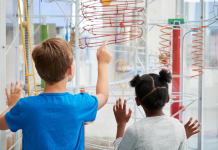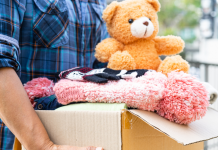If you had been around me at all in the last 2.5 years, you would have heard me talk about how DONE having babies we were. While I love being a mom, weirdly enjoy giving birth, and absolutely adore babies, my messy postpartum seasons really did a number on me. With my 3rd, I was not new to struggling with my postpartum mental health.
My first was born undiagnosed with Congenital Heart Defect and required surgery to survive at 5 days old. His entire first year was a blur filled with fear, a million doctors appointments, medications to manage, and figuring out what the difference was between “normal baby stuff” and “heart baby stuff”. Like many first time mamas, I didn’t realize how much I was struggling until I was on the other side around 18 months postpartum.
3 years after my first, we welcomed my daughter. At about 3 months old, I realized I was not okay and reached out for help from a counselor who specialized in perinatal mental health just weeks later. With 3.5 years, boatloads of counseling, EMDR therapy, and lots of introspection and planning, I was READY for my third postpartum season. Between pandemic living, my grandmother’s death, absurd hours my husband was putting in at his job, significant house repairs, and a baby who just did not like to sleep, I was struggling and this is the understatement of the year.
I think that I was more upset because I had a plan. But the crippling postpartum anxiety and depression did not care about my plan. They left me feeling like my baby’s first year was stolen from me and I was a terrible mother to my older kiddos. I had vowed to never put my family through that again and closed the door in my heart to more babies. With time, sleep, more counseling, self reflection, leaning into my faith, and help from other women and my family, I finally began feeling like myself again. I reevaluated our life, made changes and shifts that honored our values, and was excited about this next chapter of life outside the “postpartum haze”.
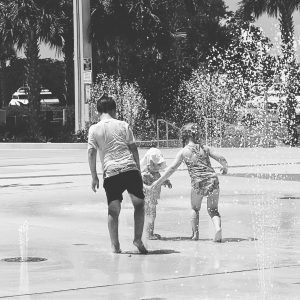
Obviously from the title of this blog you know that SURPRISE, we’re pregnant with baby number 4. I guess that’s what happens when you don’t make your decision permanent. Once the initial shock wore off, I definitely had a round of big feelings. In the moment of your highest emotions, your biggest fears begin to pour out. Mine sounded like this:
“What if I go right back into that same postpartum dark hole?”
“What if I ask for help and no one comes?”
“What if I can’t do this?”
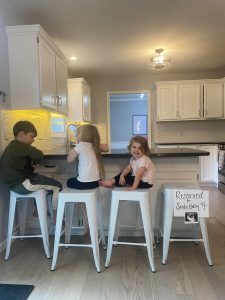
But here’s the truth, this time will be different. I am not the same woman I was during my last postpartum season. The world is not the same as it was during my last postpartum season. He’s a different baby. I’m a more experienced mom. I have more support and I know to ask for help before I’m desperate for it. I also know that no matter what happens, it is only for a season.
If you had a baby between 2020-2022 especially if it was your first, IT WAS NOT NORMAL. That was a strike against all of us in the risk factors for postpartum mental health challenges.
Do you know the risk factors for PPD or PPA?
This is straight from the American Psychological Association:
•A change in hormone levels after childbirth
•Previous experience of depression or anxiety
•Family history of depression or mental illness
•Stress involved in caring for a newborn and managing new life changes
•Having a challenging baby who cries more than usual, is hard to comfort, or whose sleep and hunger needs are irregular and hard to predict
•Having a baby with special needs (premature birth, medical complications, illness)
•First-time motherhood, very young motherhood, or older motherhood
•Other emotional stressors, such as the death of a loved one or family problems
•Financial or employment problems
•Isolation and lack of social support
1 in 5 mothers experience postpartum depression or anxiety. Some are even saying after the last 3 years that may be closer to 1 in 2. There are certain things that are outside of your control on this list. There are other things you can control. Being aware of your risk factors and making your partner and/or support network aware of your risk factors during pregnancy is incredibly helpful.
So many times women walk into postpartum thinking “oh that won’t happen to me” or “that won’t happen again”. The real answer is that it could and it might, so why not have open dialogue about preferences that you have, screen yourself regularly, research mental health providers that are available to you, know the different medication or supplements that can help, and have a support group lined up during pregnancy so you aren’t suffering in silence during postpartum. I write from experience. Opening up about your struggle to the right person is also important. Some moms, grandmas, aunts or women in the community have either repressed their pain so deep, written it off as normal, or haven’t struggled in the same way and maybe aren’t the best to reach out to for advice and empathy. We have so many wonderful resources in our community and online. My prayer is for you to find a safe person to share your story with.
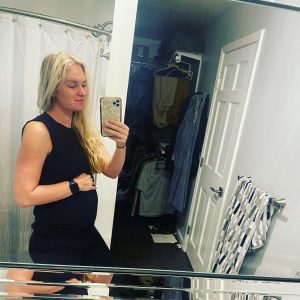
While I never pictured myself here again, I can say I’m incredibly grateful. I’m grateful for the opportunity to have a redeeming postpartum experience. That doesn’t mean it won’t be hard and won’t have struggles, but I have the privilege to grow our family, give my son the brother his little heart so badly wanted, and remind myself and all the other mamas around me that postpartum mood disorders don’t have the final say. There is hope. The fog lifts. There is joy to be found even in the mess of it all. This all goes for you too, Mama. It may be hard, it may still be messy. But we will get through it.
With Love,
Megan


